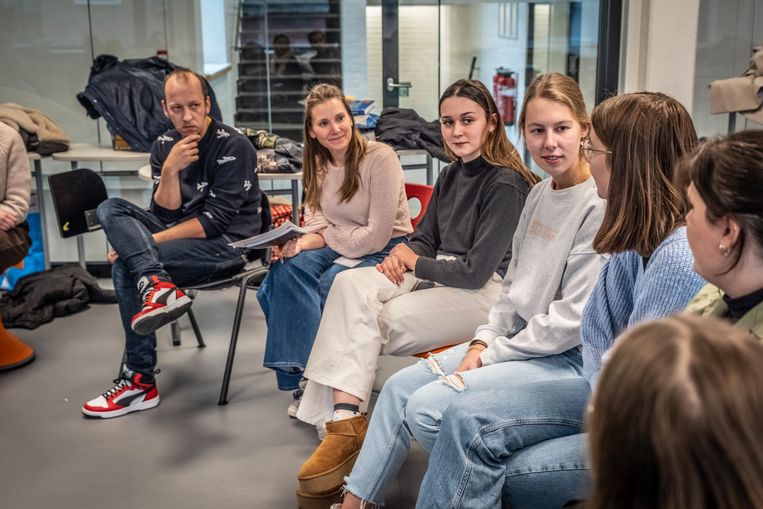A master’s degree in primary education, longer internships and a stronger focus on Dutch: a pact with various measures should strengthen teacher training courses. But does it also lead to better classroom teachers?
“If it could have been done, I certainly would have done it.” Koen Van den Bussche is firmly convinced of this: when he switched from the private to the urban primary school De Wereldreizen in Antwerp three years ago, he would have liked to have followed a master’s degree in primary education after his bachelor’s degree.
It will be possible from September 2025. The universities and colleges are committed to jointly setting up such courses. To this end, they signed a pact on Thursday to strengthen teacher training, together with Flemish Minister of Education Ben Weyts (N-VA). “We believe in our offer and are happy that we can put the most beautiful job in the world in the showcase,” he says. “At the same time, we are not blind to the shortages in training.”
Of all the measures in the pact, the master’s program is by far the most striking. The idea has cropped up regularly for years in discussions about improving the quality of education. It can also help against the teacher shortage. “Many people who want to go to primary education ultimately do not choose to do so, for example for financial reasons or because they simply want to obtain a master’s degree,” says educational economist Kristof De Witte (KU Leuven).
Universities and colleges will collaborate for the master’s degree. “Training masters is a task of universities,” says VUB rector and chairman of the Flemish Interuniversity Council Jan Danckaert. However, they have less expertise in, for example, nursery education. Universities will provide that (practical) experience.
Together they focus on three target groups: students from the professional bachelor’s program in primary education who want to deepen their knowledge, students from another (academic) program who can make the transition after a bridging program and, finally, teachers who have been teaching the classroom for several years.
Remuneration
Everyone agrees that such a master’s program has potential. But many questions remain unanswered. How exactly will this training be completed? What about the remuneration of the masters in primary education?
According to Weyts, the new course does not mean that masters who already work in primary education will earn more. It is also the explicit intention that the new masters will stand in front of the class. “We must avoid that each of these masters wants to become a policy officer or director afterwards,” says Marc Vandewalle, general director of UCLL University of Applied Sciences and general director of the Flemish Council of Universities of Applied Sciences.
“I understand that this course is aimed at people who will be in front of the classroom,” says researcher Charlotte Struyve (KU Leuven/Vives), who in 2018 collaborated on a review of all European primary education master’s courses on behalf of the government. “On the other hand, it would be a shame if they were only trained for their own class, but did not have to explicitly share the extra knowledge from the master’s degree with colleagues.”
According to Struyve, who is fond of the idea of such a master’s program, the translation to the professional field is lacking: what place do these new masters have in the school team and what does this mean on the career ladder? “It is just as important that such a master’s degree entails a certain form of specialization,” she says. “A teacher who can delve deeper into, for example, reading or writing didactics and can use that expertise in his or her own classroom and also the entire school.”
“If that is what happens, then I see the added value of it,” says Kris Cooman, director of the free primary school HHC Vondel Halle. “That teacher can then become a coach or mentor for colleagues within the school. Now that task often falls to us as management.” On the other hand, that is also a pitfall. “You risk creating a division in the staff room,” says Vandenbussche. “Are those masters going to earn more for doing more or less the same work? I still have questions about that.”
The timing for completing those questions is tight. A plan must be in place by January 1, 2024, and the training will start in September 2025. “A challenge,” Danckaert calls it diplomatically. “Almost impossible,” says another person involved.
Training schools
In addition to the master’s degree, the pact contains many other measures to strengthen teacher training. Universities of applied sciences will update their curriculum and focus more on professional knowledge, professional didactics (how do I convey that professional knowledge?) and Dutch. There must also be sufficient room for long internships.
To make educational masters more popular, the thesis is no longer required for students who have already written a thesis for another master. A so-called first aid package should help transfer students who are already teaching but who are still in teacher training to survive the first months in the classroom.
Weyts also expects that all schools in Flanders will work more closely with teacher training institutions, for example for internships. “Teacher training courses should be offered more in schools and vice versa,” says Weyts. “Every school must become a training school.”
These are ideas that experts see the added value of. Although two questions remain unanswered: how is this implemented in concrete terms? And is the budget of 15 million euros that Weyts has allocated for this sufficient?
